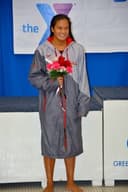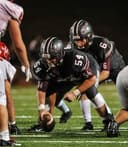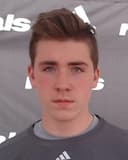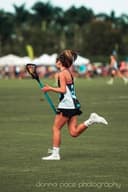
 2021 Spotlight
2021 Spotlight 2021 Highlights
2021 Highlights Hello! My name is Kayla. I have been swimming competitively for eleven years, first with a summer league and later with a USA club team and at the high school level. I fell in love with the sport when I was eight after trying softball, cheerleading, dance, and many others, none filling the satisfaction that I felt in the water. It did not feel like softball that I did for a season, sat in the outfield, and picked grass with my best friend in order to finish out the season. It was my sport. It is my sport.
The pure joy felt when diving headfirst without knowing the outcome of every race is truly one of the most exhilarating feelings in the world. I still remember that fateful race in the winter of February 2020; my last race before the yet dreaded quarantine. I arrived at the meet at 5:30 in the morning, groggy and hardly able to keep my eyes open for long enough to check in. After meeting my team on the farthest bleachers, we gathered in order to complain the morning away, and regret our decision to stay up late the previous night. Then the dreaded three words no swimmer is ready for six am on their beloved weekend: "time for warmups." Surrounded by others ranging from the three-foot-tall five-year-olds at their first championships, nervous as ever looking up to their coaches for sympathy, to the nearly seven-foot giants longing to reach a qualifying time for Nationals, or even Olympic Trials, we all have one thing in common: the love for our sport.
So, against our best interest, we faithfully enter the water, feeling as if we were plunging into the Arctic. After our communal polar plunge, all recede into their respective bleacher section indicating the team they are here to represent. The heat sheets are posted, times discovered, placements found, and the mutual Sharpie-covered hands congregate throughout, tech suits cutting off the circulation of all alike. Then the most important event of the night: the 50 free. My current time being 28.93, as I stood anxiously awaiting if I would meet my cut of 27.89. Parka drawn, sweatpants rolled, headphones blasting the latest hype music suggested per my coach. As I approach the block that I have worked for over the past ten years of my life, all the built-up anxiety comes to come at ease. I continue to calm my nerves, stand back, and watch the previous swimmers' dreams unfold. Approaching the block, I relay all the pointers subconsciously remembering my tight, fast turns, and the saying that "hurting is simply your body telling you to stop, so don't." The first whistle blows: get ready. Second whistle: step up. "Take your mark." Beep. All my muscles are toned as taper has taken over our daily practices for the past couple of weeks. The energy travels from the stored carbs of my liver down my quadriceps, through the foot flexors, and finally through the end of the toes to produce optimal propulsion straight off the block. Hands locked around the ears, legs squeezed together, perfect projectile motion to simply slide into the water, hardly breaking the surface. The cold sudden rush of adrenaline enters the system. The pure feeling of getting the power to take off settles in. Underwater kick takes me halfway down the pool. I almost reach the surface; reaching the point of the break out from under the surface tension. Hands begin to methodically exit and enter the water; elbow high, fingers almost closed, perfect angle to break the surface each stroke fast and efficiently. Here comes the wall. The flip-turn will either make or break the race. I speed up my kick and flip as tight and fast as possible. Underwater becomes present once again. My underwater world is where I belong: my aquatic home. The end of the race is closely approaching. Kick through the pain. No more breathing needed. Finish strong.
More tired than I've ever been in my life, I proceed to check my fate at the scoreboard, hoping for my almost hopeless goal of cutting off a second within the span of a month. 28.28. Over half a second gone in a month, but not nearly good enough for my goal. After being told by every coach that it was the best race I've ever swam, and to continue to work at it for next season, my reality sets in; I will not be going to Junior Olympics. After the meet, I entered my car and began to suddenly bawl as I realized that my season has come to an end, once again not realizing the truth of this statement. I would not be able to swim again until September 2021, over a year and a half later due to worldly circumstances.
Although this memoir didn't end the way that I originally hoped, it did have a pressingly positive outcome: my love for my sport was true. I was no longer swimming fifteen hours a week merely for the social aspect, but rather for my own personal gain. I now know what it truly is to be a member of a team. To have the race of your life not work out to your advantage. It all taught me that I had a love for the sport. It was no longer like softball that I did for a season, sat in the outfield, and picked grass with my best friend in order to finish out the season, it was my sport. It is my sport.







